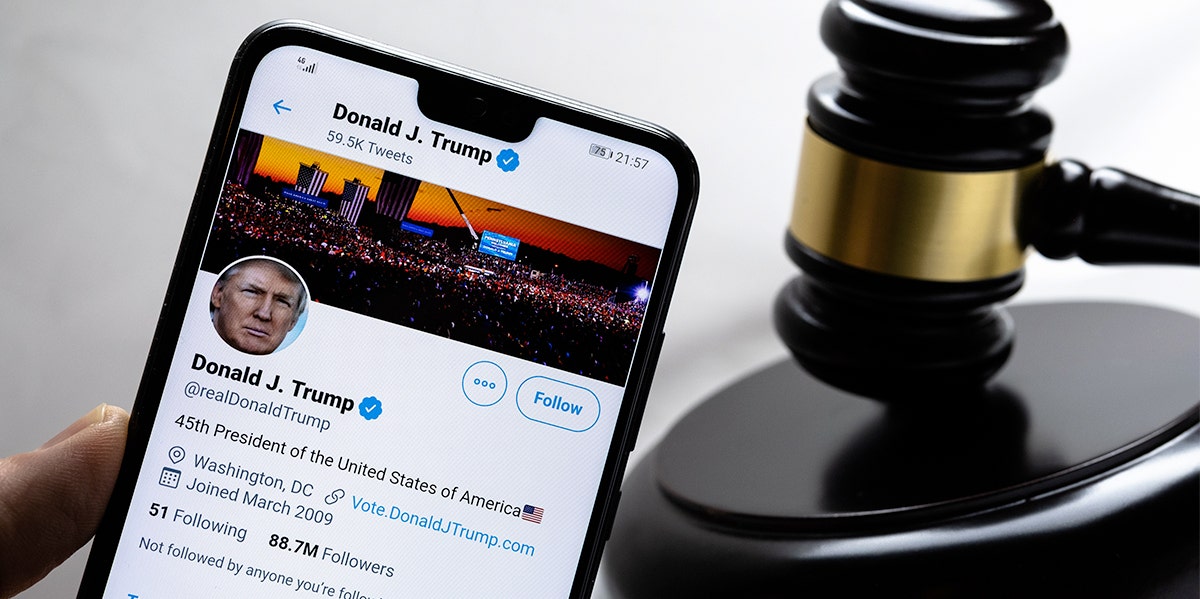Opposing Opinion Won't Disappear Just Because Big Tech Bans It
It will take more than a social media ban to stop extremists.
 Ascannio / Shutterstock
Ascannio / Shutterstock Popular websites and mainstream social media may be cracking down on Donald Trump and his supporters but it’s foolish to think this is the last we’ll see of them.
After pro-Trump mobs and right-wing extremists stormed the Capitol on Jan. 6, Big Tech engaged in a protest of a different kind, as leading social media sites raced to deplatform the President.
Twitter and Facebook announced plans to terminate Trump’s accounts indefinitely. YouTube deleted videos of the President praising the rioters.
Apple, Google, and Amazon removed right-wing social media Parler from their platforms. And numerous other companies from Pinterest to Snapchat implemented their own restrictions on Trump and some of his supporters.
Opposing opinion won't disappear because Big Tech bans it, though.
But here's the rub: Shutting off the supply won’t reverse the flood, nor will it undo the damage that has already occurred.
It’s too little too late from platforms that incentivized and allowed extremism for years.
At the core of Big Tech, companies like Facebook and Twitter are algorithms that amplify content based on emotional reaction rather than factuality.
Spreading disinformation about stolen elections and anti-democratic processes gets far more likes and retweets that non-biased election reporting.
For the entirety of Trump’s term, many of his supporters were trapped in an algorithmic echo chamber cycle of liking and sharing content that supported their beliefs, and rarely exposed them to views other than their own. (The same echo chamber sentiment can be said of leftist extremists, too.)
Social media moderators across the Big Tech platforms overlooked and ignored pro-Trump propaganda and threats against left-wing leaders since 2016 and yet, these firms are now receiving high praise for shutting down right-wing extremists at the last second.
If Trump breached Twitter guidelines by inciting the Capitol riot, why did these same guidelines not come into play when he encouraged law enforcement to shoot BLM protestors?
Shutting down Parler will only send right-wing anarchists scurrying into more discreet holes.
Parler became a favorite app for some Trump supporters to express extreme views and violent threats free from the terms and conditions of more strict mainstream platforms.
Yet the app was only on the chopping block after the Capitol insurrection, despite having been a safe haven for conservatives — some of them extremists, some not — for months.
Amazon, who hosted the platform, forced it offline by removing it from their web services, stating:
“We cannot provide services to a customer that is unable to effectively identify and remove content that encourages or incites violence against others.”
Now Parler has retaliated with a lawsuit against the tech company.
The lawsuit acts almost as an allegory for what has and will continue to happen if right-wing dissidents are silenced: They will always fight back.
And given that Parler only grew in popularity after an initial attempt by mainstream social media to quash extremism, it’s not surprising that the app’s demographic is already finding replacement sites.
Some of the QAnon conspiracy theorists and neo-Nazi incels who once called Parler home are now flocking to sites like Telegram to continue to network, spread hate speech, and instigate violence.
A few social media bans and deleted apps aren’t going to take away the true belief of millions of Americans that the election was stolen — despite factual evidence it was not.
Pushing these people underground only breeds a much deeper resentment for the left and for democracy in general.
Away from the nuances of mainstream social media, there is even less of a chance of people accessing more balanced information. Instead, these people will likely be interacting only with some of the most extreme Trump supporters and right-wing dissenters, despite many Republicans who disavow this type of rhetoric and Trumpism in their party.
Social media bans are a small bandaid over a gaping, infected wound.
Deplatforming doesn’t necessarily equate to de-radicalizing. If anything, it works against any opportunity to unify the masses and could incite even more violence.
The FBI says armed protests are already being planned in all 50 states in the days leading to Biden’s inauguration, proving that extremists will find ways to mobilize with or without Big Tech support.
Conspiracy theories about Silicon Valley’s links to far-left groups and the unfair censorship of conservative free speech are no doubt at an all-time high in the wake of these bans.
Though the deplatforming of Trump may curb some of the immediate danger he poses, any hope of educating his supporters on democracy and equality will take much longer.
And for those who do not support Trump, no longer being exposed to his extremism on Twitter, Facebook, and Instagram will do little to reduce fears of what his extremist supporters might do.
Existing in an echo chamber of liberal views and pro-democracy sentiment might be enjoyable when scrolling through our phones, but it does nothing for the wider divisions in American society.
If we have learned anything from the last four years, it’s that conservative prejudicial attitudes and the hate that many of us would rather have believed was left in past still exists in every facet of society.
Shining the light away from this reality by banning it from social media will only return us to ignorance and give these extremists space to reorganize themselves and cause even more havoc.
Alice Kelly is a writer living in Brooklyn, New York. She is a generalist with an interest in lifestyle, entertainment, and trending topics.

